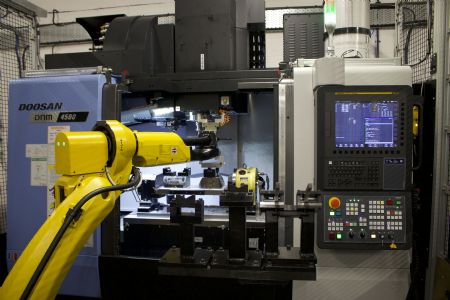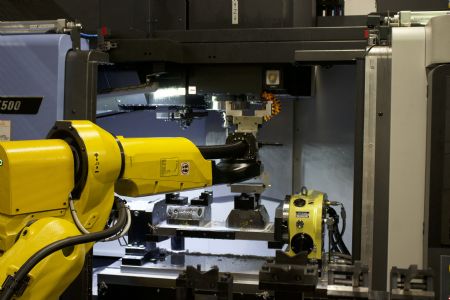
Significant growth in global demand for its market-leading fire protection and fire suppression systems has been the catalyst for
Ardent Ltd in Yorkshire to invest in an innovative, flexible and highly customised automated manufacturing cell. It has been designed and installed by Leamington Spa-based
Mills CNC, the exclusive distributor of DN Solutions’ (formerly Doosan) machine tools and a major automation systems solutions provider to UK and Irish component manufacturers.
The cell, installed at Ardent’s facility in Roecliffe earlier this year, comprises a Puma 2600SY II multi-tasking sub-spindle, Y-axis lathe and a DNM 4500 high-performance three-axis vertical machining centre, integrated with a SYNERGi Sprint robotic automation system.
It is being used to machine a range of high-precision, complex components that are integrated into the company’s fire suppression systems — including performance-critical brass BSP and jig valves, supplied as blanks, that are machined in batches using both the Puma lathe and DNM machining centre, as well as batch-machined aluminium enclosures, machined from solid, on the DNM 4500.
Although the cell was delivered and installed in May this year, its design, development and, ultimate proving out, began a number of months earlier at a time when worldwide Covid-19 restrictions were being lifted and business, across many sectors, was returning to pre-pandemic levels.

Paul Newton, Ardent’s production manager, said: “Although the pandemic did hit a number of sectors where our fire suppression systems and solutions are used, including transport, aviation, ports and docks, construction and rail, we were confident that it was only a matter of time before they ‘bounced back’.
This, combined with a dramatic increase in demand from a growing number of mining customers, located primarily in Africa, who use heavy-duty excavators, bulldozers, loaders and crushers in their operations, resulted in us reviewing the capacity and capabilities of our in-house manufacturing operations.
“We were conscious that the effect of business returning to pre-pandemic volumes in conjunction with the new business contracts we had secured, would put pressure on our existing machining resources. If left unchecked, this would negatively impact on turnround times and our ability to meet customer lead times.”
Ardent’s existing machining resources comprised a previously-acquired Puma 2600SY lathe and a vertical machining centre. Operating, in effect, as standalone machines the company’s valve components, for example, were first machined on the lathe, using its Y axis, sub-spindle and driven tooling capabilities, before being manually transferred to a machining centre for finishing operations.
Although the process worked it was not as efficient as it could be. The over-reliance on manual intervention to move parts from the lathe to the milling machine was costly and created ‘dead time’, increased overall part cycle times and cost per part. It was a similar situation with the machining of the enclosures, with machine shop staff having to be on hand to load and unload the parts manually.
Automated manufacturing cellMr Newton continued: “With the increase in demand for our systems we simply couldn’t rely on our existing resources or methods. Instead of increasing capacity by duplicating what we already had and, as a consequence, the way we did things, we began exploring alternatives and, in particular whether automating our operations, via an automated manufacturing cell, would be a viable and cost-efficient option.”

Having already invested in the Puma 2600 lathe and having experienced and liked Mills CNC’s proactive business approach and its after-sales service support, Ardent naturally turned to Mills CNC to find a solution.
Focused on ramping up the efficient and reliable machining of its valves and enclosures, Ardent required an automation solution that was flexible, compact, easy-to-use and one that would enable the company to achieve unattended, lights-out and continuous production.
The resulting automation cell comprises a new Puma 2600SY lathe and a DNM 4500 vertical machining centre. Both machines are equipped with the latest Fanuc
i Plus controls and have automatic door open/door close capability.
The 10in chuck/81mm bar capacity box guideway Puma 2600SY II lathe features a +/-52.5mm Y-axis, a 22kW/4,000rev/min built-in main spindle, a 15kW 6,000rev/min sub-spindle, and a 12-station (24-station indexing) servo-driven turret with 5,000rev/min driven tooling capability. The machine was supplied with Hydrafeed MSV 80 bar feeder to increase, and capitalise on, the lathe’s flexibility and productivity potential.
The DNM 4500 machining centre features an 18.5kW/12,000rev/min spindle, a 60-position automatic tool changer and was supplied with a Nikken 4th-axis unit for precision indexing and Renishaw probes for in-process measurement and inspection. The automation element is provided by a heavily customised SYNERGi Sprint system comprising a Fanuc industrial robot, a 900 x 900mm grid plate to hold the brass blanks and aluminium billets waiting to be machined, and finished valves and enclosures. A robot linear rail, running between the Puma lathe and the DNM machining centre, enables the robot to service both machines.
Inherently flexibleMr Newton added: “The cell is inherently flexible. The Puma lathe, for example, is an integral part of the cell when machining our valve components but can also operate independently as a standalone chucking or bar fed turning centre when the rest of the cell — the robot and the DNM 4500 machining centre — are being used to machine the enclosures.

“The use of multi-socket inserts enables us to set up the cell for batch production and allows us to run the system unattended, overnight and over the weekends too, if required.”
The cell enables Ardent to either machine 63 valves or 12 enclosures at a time with minimal human intervention and is a significant improvement over what the company’s previous machining methods could produce.
Mr Newton concluded: “It is a fantastic system that meets our immediate and future production requirements. Credit goes to Mills CNC’s sales and applications engineers for designing and installing such a high-productivity, customised turnkey automation solution for us.”